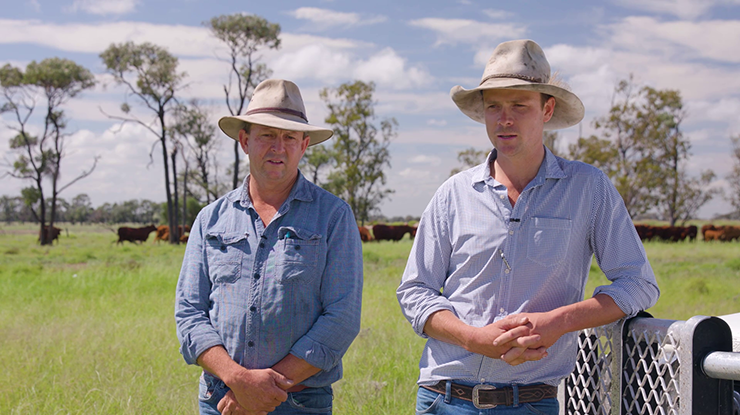
Amid a booming cattle market, producing cattle that continue to achieve high rates of compliance to Meat Standards Australia (MSA) remains a priority for Queensland beef producers, Rod and Kylie Apelt.
With their son, Tori, and his wife Kaitlin, the Apelts operate Collingwood Pastoral Company, producing beef and broadacre crops across the State's Western Downs and Maranoa regions.
The Apelts have won the Most Outstanding Queensland Producer (Band 1) category in the 2021 MSA Excellence in Eating Quality Awards, having achieved an MSA compliance rate across 2019–2021 of 99.9% and average MSA Index of 62.03.
The Apelts run 1,500 breeders, producing purebred EU-accredited Santa Gertrudis, Angus, and Santa Gertrudis-Angus cross cattle on a combination of improved pastures and forage crops.
Nutrition a necessity
Rod said quality nutrition was a key factor in consistently producing high eating quality beef.
"We breed the bulk of our cattle and season permitting, we do trade cattle, buying in and growing them out," Rod said.
"We have a lot of improved pastures to finish our weaners off on including Bambatsi, Reclaimer Rhodes Grass and a little bit of buffel and green panic – and we've had great success with those pastures in terms of improved stocking rates.
"We also grow forage sorghum, oats, and barley, so the cattle run on those crops – and we often supplement them when the forage dries off with molasses-based liquid supplement Molafos. If it's really dry, we supplement them in the paddock with grain.
"We also produce silage if the opportunity arises, but we only really use it if there's a dip in the market and we don't have a huge volume of feed."
Choosing the market
The Apelts send finished cattle for processing as milk-tooth cattle with a 520-600kg liveweight to supply Coles or Woolworth.
"We bring our cattle in from the Maranoa where we breed, finish and then market them from our home base at 'Collingwood', near Tara," Rod said.
"We also run cattle at Glenmorgan and Goondiwindi and do the same with them."
"More recently, we have been targeting the feeder market with our cattle, due to current market conditions."
"Our location on the Western Downs means there are a range of feedlots we can sell to."
Selecting and managing for results
Choosing the right genetics is also important to the Apelts' strategy for producing high eating quality beef.
"When we're buying bulls, we look for high intramuscular fat and a reasonable eye muscle area (EMA), in addition to other traits," Rod said.
"This year we bought some bulls online because we couldn't travel to New South Wales due to COVID-19 restrictions, but I prefer to cast my eye over them in person as well as looking at the data."
Temperament and best practice livestock management are also priorities for the business to ensure healthy, high performing livestock, according to Rod.
"Docility is important and the more relaxed the cattle are, the better," Rod said.
"When we wean, we spend two to three weeks in the yards working with the weaners."
"I think it's very important to train the cattle, so they're settled into their environment for the rest of their life."
The Apelts also look to carcase data as a benchmarking tool in their business to ensure their cattle hit the MSA target.






